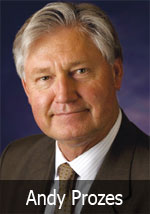 When Andy Prozes took the helm at LexisNexis in 2000, the com pany was the go-to resource for legal records, relied upon by law firms and corporate law departments as a one-stop resource for all manner of articles and public records. In fact, among the legal community, “LexisNexis” was practically a verb, as in “I’ll Lexis it and see what turns up.” That kind of brand equity-a name that’s synonymous with the service you provide-is tough to come by.
When Andy Prozes took the helm at LexisNexis in 2000, the com pany was the go-to resource for legal records, relied upon by law firms and corporate law departments as a one-stop resource for all manner of articles and public records. In fact, among the legal community, “LexisNexis” was practically a verb, as in “I’ll Lexis it and see what turns up.” That kind of brand equity-a name that’s synonymous with the service you provide-is tough to come by.
As Prozes is finding out, it’s also tough to change. Seven years later, LexisNexis is a very different company, but “the market doesn’t understand that we’re no longer a database company,” says Prozes, who spent the last seven years working to transform LexisNexis from primarily a research entity into a strategically aligned, global solutions provider. “When I came on board, we were a very dispirited, [disjointed] company that was losing out to our prime competitor, Thompson,” recounts Canadianborn Prozes, who has seen revenues rise from $1.9 billion (2001) to $3.2 billion (2007) under his tenure. “We needed to build a global organization that was unified under a common brand around a common strategy, and to focus on improving our products through a renewed emphasis on technology.”
Prozes lost no time taking steps to bring the ailing collection of disparate country operations of Lexis- Nexis, a division of Reed Elsevier based in
to what we do in
Much of that additional technology came to LexisNexis through a series of acquisitions-35 over the past nine years-which had to be integrated into the company’s offerings and sold to a client base spread out over more than 100 countries.
“Lawyers all over the world need to handle their practices, get new clients, handle litigation, apply for patents and so on,” says Prozes. Delivering such information-based solutions to lawyers across the globe comprises the bulk of LexisNexis’ total revenue-about 75 percent.
While the
“RIA has grown dramatically, and continues to grow in the double digits,” says Prozes, who says the credit card boom and security concerns are the principal drivers of that growth. “Laws about [privacy] are much more stringent here in the U.S. and in the U.K., which means that you have to rely much, much more on news articles to verify that people are who they say they are-and we have by far the largest database of news articles of anybody else on the face of the Earth.”

Chief Executive Group exists to improve the performance of U.S. CEOs, senior executives and public-company directors, helping you grow your companies, build your communities and strengthen society. Learn more at chiefexecutivegroup.com.
0

1:00 - 5:00 pm
Over 70% of Executives Surveyed Agree: Many Strategic Planning Efforts Lack Systematic Approach Tips for Enhancing Your Strategic Planning Process
Executives expressed frustration with their current strategic planning process. Issues include:
Steve Rutan and Denise Harrison have put together an afternoon workshop that will provide the tools you need to address these concerns. They have worked with hundreds of executives to develop a systematic approach that will enable your team to make better decisions during strategic planning. Steve and Denise will walk you through exercises for prioritizing your lists and steps that will reset and reinvigorate your process. This will be a hands-on workshop that will enable you to think about your business as you use the tools that are being presented. If you are ready for a Strategic Planning tune-up, select this workshop in your registration form. The additional fee of $695 will be added to your total.

2:00 - 5:00 pm
Female leaders face the same issues all leaders do, but they often face additional challenges too. In this peer session, we will facilitate a discussion of best practices and how to overcome common barriers to help women leaders be more effective within and outside their organizations.
Limited space available.

10:30 - 5:00 pm
General’s Retreat at Hermitage Golf Course
Sponsored by UBS
General’s Retreat, built in 1986 with architect Gary Roger Baird, has been voted the “Best Golf Course in Nashville” and is a “must play” when visiting the Nashville, Tennessee area. With the beautiful setting along the Cumberland River, golfers of all capabilities will thoroughly enjoy the golf, scenery and hospitality.
The golf outing fee includes transportation to and from the hotel, greens/cart fees, use of practice facilities, and boxed lunch. The bus will leave the hotel at 10:30 am for a noon shotgun start and return to the hotel after the cocktail reception following the completion of the round.